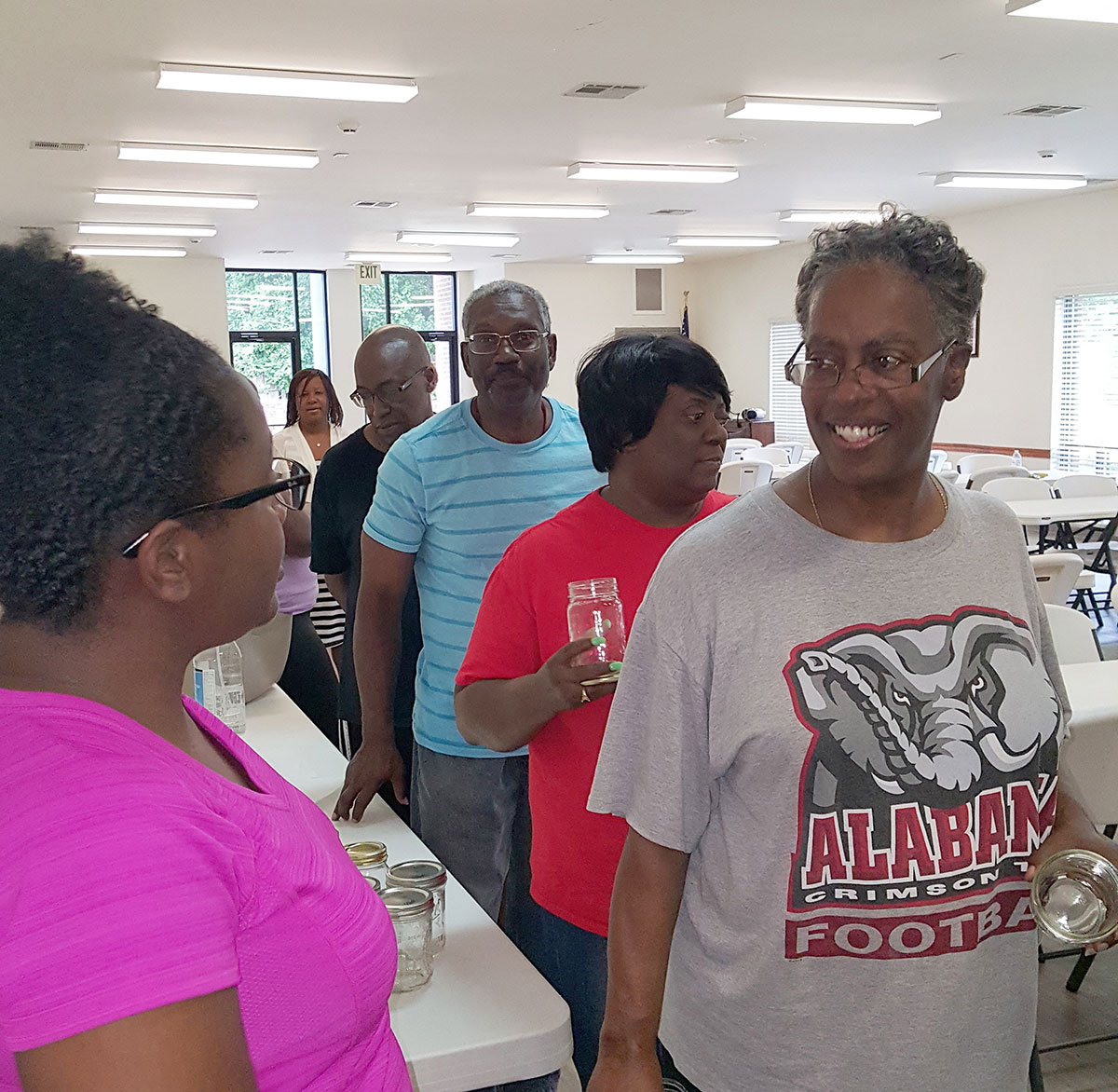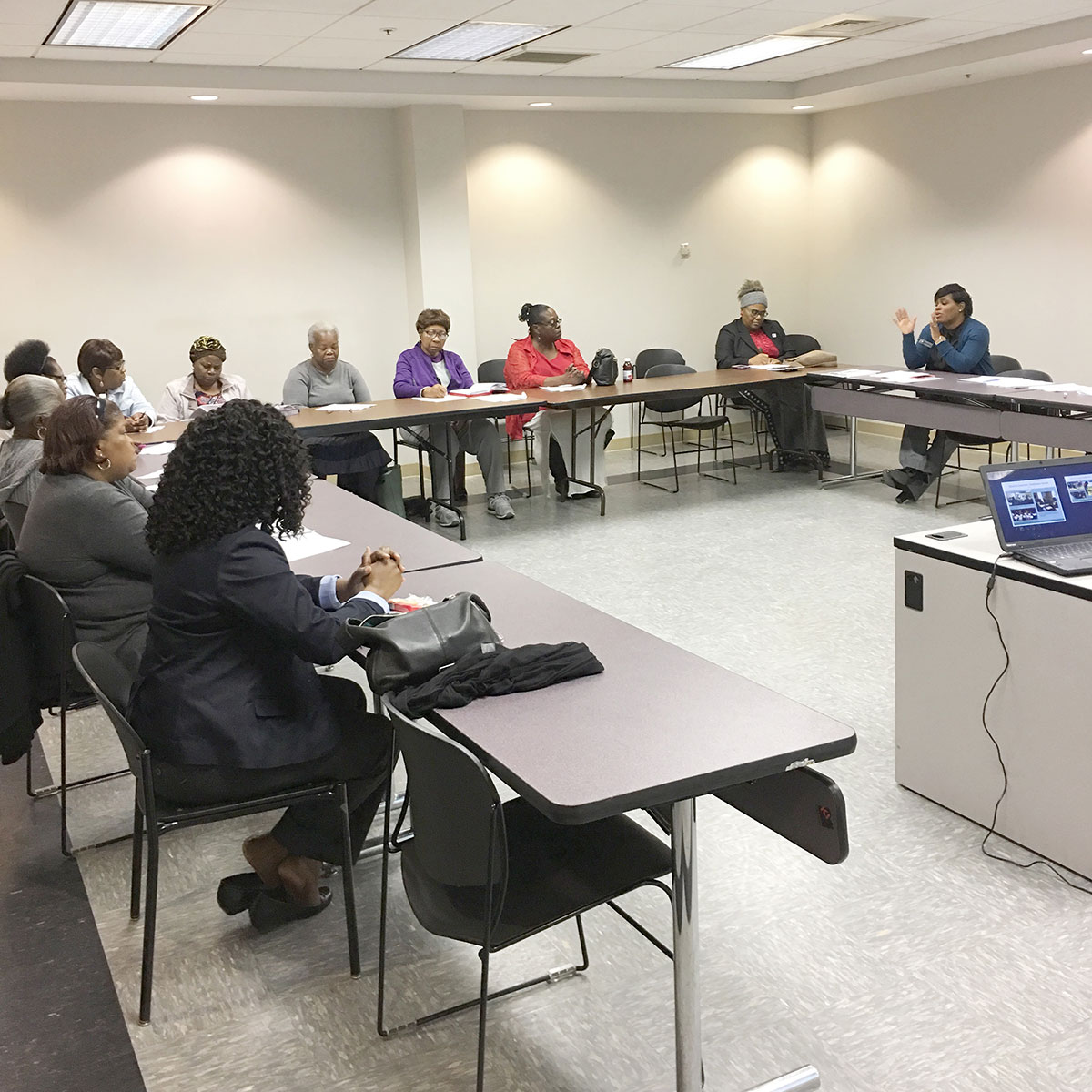
Health Ministry attendees get supplies to create their healthy salad jars at Shiloh Missionary Baptist Church.
Funding through a REACH cooperative agreement from the Centers for Disease Control and Prevention (CDC) granted The Wellness Coalition (TWC) an opportunity to collaborate with numerous churches throughout Montgomery, Macon, and Lowndes counties to offer health-based services. Two of the services are chronic disease self-management classes (Living Well Alabama) and community garden training. In addition to these successful REACH interventions, TWC recently partnered with churches to develop a sustainable program focusing on the overall health of the congregation. This program is known as health ministries.
A health ministry is an opportunity for faith-based organizations to strengthen an individual’s mental, physical, emotional, and spiritual state to improve their health. As an established resource in various areas with high rates of poverty and chronic disease, churches may offer services, programs, events, or classes that can motivate change for an individual. This change impacts the individual’s state of well-being, creating a sense of health ownership.
Within health ministries, each church instills their faith and traditions into health-based programs. Participants may also be connected to public engagements, networking opportunities, prayer groups, nutrition education, and physical activity events. Ideally, an individual’s lifestyle change may influence another person to make similar health changes, then another person may follow suit, and so on. As this trend continues, impacts from health ministries may eventually improve the overall health of entire communities.
How REACH Health Ministries Got Started
The Wellness Coalition began the process of engaging churches to start health ministries by mailing an interest letter to all the churches located within the 21 REACH census tracts. As a result, 12 churches responded to the letter and expressed interest in partnering with TWC to develop a health ministry for both their congregation and their surrounding community.
To teach them more about this partnership and where to begin, representatives from all 12 churches were invited to attend a two-hour training session at the Montgomery County Health Department on March 7, 2018. Pastors, church leaders, and elders of the churches learned about theoretical approaches and potential impacts of a health ministry, with an ideal goal being that a health ministry would be an influential resource for years to come. Attendees also had the opportunity to discuss programs that they are currently implementing or intended to start, and how they could be incorporated into a total wellness strategic plan for their ministry.
The next step in the development process included a request that interested churches submit a formal plan incorporating the ideas discussed in the training session. Three churches provided TWC with a comprehensive plan of action to implement their health ministries. Upon review of each plan, TWC invited the designated health ministry liaisons from each of the three churches to a fidelity meeting to review and understand obligations and administrative requirements such as invoicing and progress reports. Finally, the liaisons were able to begin:
- Recruiting members for a health ministry committee
- Assessing skills among the congregation
- Networking to attain external health-related resources
- Organizing community-based events
- Advertising programs within their surrounding area

Representatives from churches listen to information being shared at the Health Ministry Training.
King Hill Missionary Baptist Church
Mary Myles, health ministry coordinator for King Hill Missionary Baptist Church in Montgomery, began this process by organizing a 9-person committee to guide the ministry. Having a large area of green land on the church property, the church envisioned that this area would be used to create a community garden. With assistance from the committee, this vision became reality as members of the church and community used their skills and labor to prepare the land for planting. When the sowing and planting period began, garden experts presented gardening education during an event open to their entire community.
Passionate members from the surrounding area signed up for garden activities such as planting, garden maintenance, and harvesting. Furthermore, an informational table was set up at each event to disseminate nutrition flyers and brochures emphasizing nutrition variety, understanding food labels, and portion control. Knowledge was also shared with younger generations during a “Chat & Chew: Shapes & Smoothie” lunch. Children who attended were enthusiastic to learn and taste healthy food options, such as fruits and vegetables in the form of delicious smoothies. Myles and King Hill Missionary Baptist Church continue to plan for future programs that will raise awareness of chronic disease and preventative actions that can be taken.
St. Peter’s African Methodist Episcopal Church
Pastor Valtoria Jackson of St. Peter’s African Methodist Episcopal (AME) Church in Montgomery, previously partnered with The Wellness Coalition to develop a church garden to improve community access to fresh produce. As these gardens flourished, even after the contractual partnership was completed, Pastor Jackson sought out more opportunities to expand St. Peter’s Health Ministry.
Without hesitation, Pastor Jackson expressed interest to collaborate a second time to continue efforts with the community garden and nutrition education, and to also incorporate educational components in other health areas. St. Peter’s hosted a garden day, with assistance from Farmscape, to replenish the garden beds and teach community members about the best practices of growing, cultivating, and harvesting produce.
To provide opportunities for other programs within their health ministry, St. Peter’s administered a health assessment among the congregation to understand the needs of the individuals who attend the church. Diabetes was identified as an emerging issue, so St. Peter’s contacted Rosnita C. Strayhand, a diabetes prevention consultant, to provide seven educational sessions focusing on preventative measures and ways to manage their condition. As a result, 23 individuals attended these sessions. Youth were also involved with similar classes that focused on a healthy nutrition and reducing sugar intake to lower the risk of developing type 2 diabetes. Additionally, Corporal Cedric Leonard conducted a presentation on Mental Health at the church location to raise awareness and provide aid to individuals who may have these conditions. St. Peter’s AME continues to search for more opportunities to collaborate with partners to raise awareness and share knowledge to improve the health of their community.
Shiloh Missionary Baptist Church
Coordinated by Stephanie Nettles, the Health and Wellness Ministry at Shiloh Missionary Baptist Church (SMBC) focuses on a broad scope of health areas including:
- General health awareness
- Exercise and fitness classes
- Stress reduction programs
- Nutrition education
As part of placing a general focus on nutrition for these past months, SMBC hosted a “Healthy Salads in a Jar” class in May to introduce creative yet healthy forms of meal prepping for the work week. Facilitated by Alyxandra Price, participants were guided through step-by-step directions to create their own salad jar. Each attendee also received colorful carrying bags full of nutrition information and handouts. SMBC also encouraged the youth group to follow a healthy eating regimen by hosting a “Tacos for Youth and Parents” day in May. The health ministry also promoted exercise and the importance of physical activity throughout their Vacation Bible School in June.
SMBC continues to supply tips and advice in creative ways using flyers and poster boards. As they wrap up programs for June, SMBC looks forward to future partnerships including the planning of Zumba and other fitness classes in July and August.
Partnering with faith-based organizations has had a positive impact on communities. Through strategic planning, each health ministry has offered a diverse number of programs catering to various chronic health conditions and age groups. The fruits of these programs are just taking shape, but with continuous partnerships and motivation, health ministries at churches can become a sustainable resource to battle health inequalities for a long time to come.
